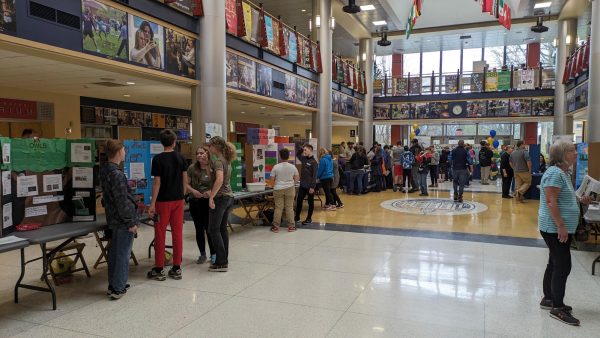Housekeepers union seeks hazard pay, additional equipment
This past week, contract negotiations began between St. Moritz Building Services and Workers United Union, which represents the St. Moritz workers.
The 2016 round of negotiations inspired the creation of the Allegheny Coalition for Labor, a student-led group that works to promote respect and awareness of workers.
“We began around 2016 during the contract negotiations between the St. Moritz workers’ union and St. Moritz to show students support (and) to send the message to the (Allegheny) administration that we as students care about how the workers are treated because they hadn’t gotten increased pay in many years,” said Shula Bronner, ’22, co-chair of the Coalition for Labor. “In the past couple years we’ve done worker appreciation lunches, and now that negotiations are happening again, we’re really ramping up to support them.”
Due to the current COVID-19 pandemic, additional disinfecting procedures have been put in place across campus.
“We have to clean the bathrooms twice per day during our shift,” said Patty Ferry, union representative and housekeeper in Ravine-Narvik Hall. “Usually I’ll do the toilets and check the sinks, but then you spray with the disinfectant. I leave it on. That’s only the second (time) around. I (also) spray the handles and the doorways the kids come (through).”
To ensure that workers have enough time to complete their rounds, St. Moritz has adjusted the cleaning schedules and assignments at Allegheny, hiring new personnel if needed.
“I had Brooks also, but we just had bidding, and they took Brooks off to make the extra cleaning easier,” Ferry said. “There were three of us that had Brooks and then we went to our own buildings. It did make it easier for us to get our second trip around … They did hire one girl today (Oct. 22). I believe there’s more, but they have to be tested (for COVID-19).”
With additional workers comes a need for additional equipment, something that even current workers are sometimes struggling to find.
“(Some housekeepers) feel we need more hazard pay and more protective gear than what we have,” said Jennifer Garrett, union representative and third-shift housekeeper at the David V. Wise Center. “Some of them feel that we should be able to double-glove, because sometimes we don’t even have the gloves in the office. (Also) that they should be providing the masks, that we shouldn’t have gone out and gotten our own.”
Ferry noted that there already were some supplies available for workers, but agreed that there were sometimes shortages.
“They provide the paper masks — they did have some down there (that) have a filter in them, those are new down there,” Ferry said. “The Clorox wipes they got more — they’re hard to come by. They provide (for the workers in) Allegheny Hall and Edwards, the two buildings that they use for the students (that need to be quarantined) … the suit, if they choose to wear the gloves, the respirators … I mean the supplies, they come and they go. There’s a lot of people that we work with.
Ferry noted that hazard pay for working in Allegheny’s residence halls during the pandemic is expected to be on the agenda for the negotiations.
“The two people that do work in those two buildings (Allegheny and Edwards) do get extra pay,” Ferry said. “But as for the rest of the people, not yet.”
Given that the negotiations are private, Allegheny College and its students do not have a direct seat at the table when it comes to influencing the final contract. But according to Bronner, that does not mean that the college has no contribution to the discussion.
“We do have an impact on Allegheny’s message to St. Moritz when they renew their contract,” Bronner said. “We have our Campus Statement of Community, which says that we believe that everyone should be treated with respect … that includes all members of the campus community, especially workers. We believe that they should be treated fairly and that they should be paid fairly. My message to the Allegheny administration would just be to make sure that even though you are not directly hiring the workers, you’re contracting with St. Moritz, (and you should) make sure those values are shared.”
Beyond advocacy, Bronner also asked that students can help by paying attention to those around them.
“I think even just saying, ‘Thank you’ if you see them around, saying, ‘Hi,’ or ‘Good morning’ (can help),” Bronner said. “Also making sure to take care of shared spaces (and) not leave them a mess on purpose because you know you’re not the one cleaning up.

Sami Mirza is a senior from many different places. He is majoring in International Studies with a focus on the Middle East and North Africa and minor in...






